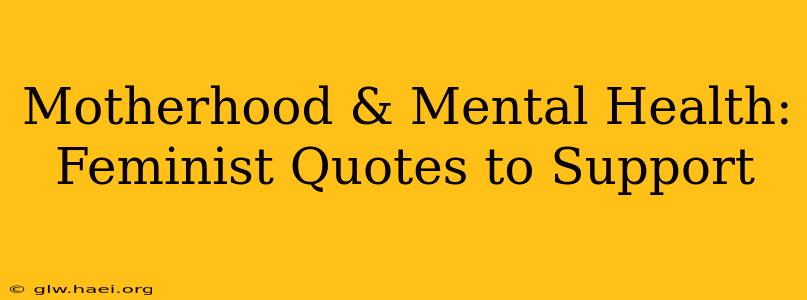Motherhood. The word itself conjures a whirlwind of images: unconditional love, boundless joy, and the unwavering dedication of a lifetime. But nestled within this idyllic picture lies a harsh reality often unspoken: the profound impact motherhood has on mental health. For many mothers, the transition to parenthood is a rollercoaster, marked by moments of immense bliss interwoven with feelings of overwhelming anxiety, exhaustion, and isolation. This is where the empowering voice of feminism becomes crucial, offering a supportive framework and a much-needed counter-narrative to the often unrealistic and idealized portrayal of motherhood.
This journey isn't just about sleepless nights and endless diaper changes; it's a complex tapestry woven with emotional and mental threads that often go unnoticed or dismissed. Feminist thought provides invaluable tools to navigate these challenging waters, empowering mothers to acknowledge, validate, and address their mental health struggles without shame or guilt.
What are the common mental health challenges faced by mothers?
The transition to motherhood can trigger or exacerbate a range of mental health conditions. Postpartum depression (PPD) is perhaps the most widely recognized, but it's far from the only concern. Anxiety, obsessive-compulsive disorder (OCD), and even psychosis can manifest during pregnancy and the postpartum period. The hormonal fluctuations, sleep deprivation, and overwhelming responsibility often contribute to these challenges. Many mothers also grapple with feelings of inadequacy, guilt, and a profound sense of isolation. These feelings are rarely acknowledged in the idealized images of motherhood so often presented to us.
How can feminist perspectives help mothers cope with mental health issues?
Feminist thought provides crucial support in several ways:
-
Validating Experiences: Feminism centers the lived experiences of women, including mothers. It challenges the societal pressure to present a perfect, always-happy facade, acknowledging the validity of negative emotions and struggles. This validation is the first step towards healing and seeking help.
-
Challenging Societal Expectations: Traditional gender roles often place an immense burden on mothers, expecting them to be relentlessly selfless and always capable. Feminism dismantles these unrealistic expectations, allowing mothers to prioritize their own well-being without feeling guilty or selfish.
-
Promoting Self-Care: Feminist thought emphasizes the importance of self-care, not as a luxury but as a necessity. This includes prioritizing mental health, seeking professional help when needed, and building a supportive network.
-
Demanding Systemic Change: Feminism advocates for systemic changes that support mothers' mental health, such as accessible and affordable childcare, parental leave policies, and destigmatizing mental health struggles.
What support systems are available for mothers struggling with mental health?
It’s vital to remember that you are not alone. Many resources are available to support mothers struggling with their mental health:
-
Therapy: Talking to a therapist specializing in perinatal mental health can be incredibly beneficial. They can provide a safe space to process emotions, develop coping mechanisms, and receive evidence-based treatment.
-
Support Groups: Connecting with other mothers who understand your struggles can provide invaluable support and reduce feelings of isolation. Online and in-person support groups offer a community where shared experiences can foster healing and resilience.
-
Medical Professionals: Obstetricians, midwives, and family doctors play a crucial role in identifying and addressing mental health concerns during pregnancy and postpartum.
-
Hotlines and Crisis Services: In times of crisis, helplines and crisis services provide immediate support and guidance.
Are there any famous feminist quotes that offer comfort and strength to mothers?
Feminist thought offers a wealth of quotes that resonate with the challenges and triumphs of motherhood. While specific attribution can sometimes be challenging, the spirit of these sentiments captures the essence of feminist support:
"The most common way people give up their power is by thinking they don’t have any." – Alice Walker. This quote encourages mothers to recognize their inherent strength and agency.
"The future is female."- This slogan, though widely attributed, embodies the hopeful vision of a future where women's experiences, including those of motherhood, are fully valued and supported.
How can I integrate self-care into my daily routine as a mother?
Self-care isn't selfish; it's essential for both your well-being and that of your family. Even small acts of self-care can make a significant difference:
-
Prioritize sleep: Even short periods of restful sleep can significantly improve mood and energy levels.
-
Engage in activities you enjoy: Make time for hobbies, interests, or simply relaxing activities that bring you joy.
-
Connect with supportive individuals: Spend time with loved ones who offer understanding and encouragement.
-
Seek professional help when needed: Don’t hesitate to reach out to a therapist or other mental health professional.
The journey of motherhood is a unique and deeply personal one, filled with both immense joy and unforeseen challenges. By embracing the empowering messages of feminism, mothers can navigate these complexities with greater self-awareness, resilience, and a renewed sense of strength. Remember, asking for help is a sign of strength, not weakness. Your well-being matters, and you deserve support.

